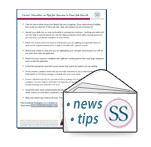Military Transition: 10 Steps for Transitioning to a Civilian Career
- Enroll in the Transition GPS Class (formerly known as TAP class): Transition GPS includes a five-day workshop with additional days of training available. Part of the class is spent on job search strategies, including resume writing and interview preparation. You can also fill out a survey to receive information about other training, including finances and VA benefits.
TIP: There is a lot of information to absorb in one week. You may want to take the class over a year out to get an overview and then sign up a second time closer to your transition.
- Attend a Military-Oriented Job Fair: There are organizations that specialize in job fairs for military members and their families. Recruit Military and Hiring Our Heroes hold job fairs all over the country and have a list of upcoming events on their websites. The Service Academy Career Conference is another source for service members who graduated from one of the academies.
TIP: When you attend a job fair make sure to take notes. After each booth, take a moment to write down who you talked to and what you talked about. Ask for contact information and then follow up with a personalized note based on your conversation.
- Work with a Military Recruiter / Headhunter: There is nothing better in the job search process than being approached with an opportunity. Companies such as Bradley Morris, the Lucas Group, and Orion International specialize in recruiting military members.
TIP: Consider creating a new email account for your job search. This can help to keep everything organized and give you one place to browse if you are receiving a lot of recruiter emails.
- Update your LinkedIn Profile: LinkedIn is one of the fastest growing job search tools and a great place to begin your job search. Make sure that your profile is up to date with a good summary and recent information. Then reach out to anyone you know that would be a good connection and request recommendations from your current connections.
TIP: Consider translating your military title / rate to a civilian-friendly job title. Schofield Strategies, LLC creates LinkedIn profiles for transitioning veterans. Contact Schofield Strategies, LLC if you want any assistance!
- Reach Out to Your Network: Reach out to coworkers, friends, and family to let them know that you are transitioning and describe the type of work you will be looking for. Word of mouth is one the best ways to hear about new opportunities. Reach out to friends that have already made the transition and ask their advice on what they would have done differently or what resources were the most helpful.
TIP: If you need additional information on networking, these blog posts may help: Top Networking Tips – Who Is Your Network? and Build Your Network Before You Need It!
- Organize Your Evaluation Reports and Awards: Many service members transitioning out of the military do not have a resume and will need to create one from scratch. The good news is that you are already an expert at writing resume bullets – just look at your evaluation reports (depending on which branch you are in, you may be more familiar with the term FITREPs, EVALs, Pros/Cons, OPRs, EPRs, or EERs). Make a list of your duty stations and titles. Then gather your evaluation reports and award summaries together into a packet that you can use to create your resume.
TIP: Create a digital copy of your packet with your personal information redacted. This will be helpful if you are working with a resume writer or other job search service to develop your resume.
- Gather References: The best time to gather references is while you are still in contact with bosses and co-workers. Reach out to people you know, including those at past commands, and ask for a recommendation on LinkedIn or a letter of reference for your job search file.
TIP: Keep a file with all of your reference letters together. It is also a good idea to scan them and save them together with descriptive file names.
- Hire a Resume Writer Who Has Worked with Military Clients: Whether you have a previously-written resume or no resume at all, it can be extremely helpful to work with a resume writer. Search for a resume writer who has experience working with military clients, already knows how to read your evaluation reports, and who can translate your experience to the civilian sector to make you stand out.
TIP: Schofield Strategies, LLC specializes in resume writing for transitioning military members. Check out our Resume Page for information on our services.
- Utilize Military Transition Resources: There are a lot of programs and websites with resources for transitioning service members. To help filter through the long list of organizations and websites, ask your friends what resources have been the most helpful to them. MilitaryOneSource.mil and GIJobs.com both offer articles and other resources with helpful advice. Careerinfonet.org can help with occupational profiles to translate military experience to civilian terms.
TIP: If you would like additional resources, please contact Schofield Strategies, LLC.
- Take some time for you! There are so many things going on as you transition out of the military. You are often relocating, looking for work, and inundated with government paperwork. Take a little time away from everything to recharge before you tackle your next task.
Note: This blog post only touches on certain aspects of this topic and is not a comprehensive list. This blog post is an educational and informational resource for job seekers and is not a substitute for working with a resume writer or other professional. See our Terms and Conditions for additional information.








Comments are closed.